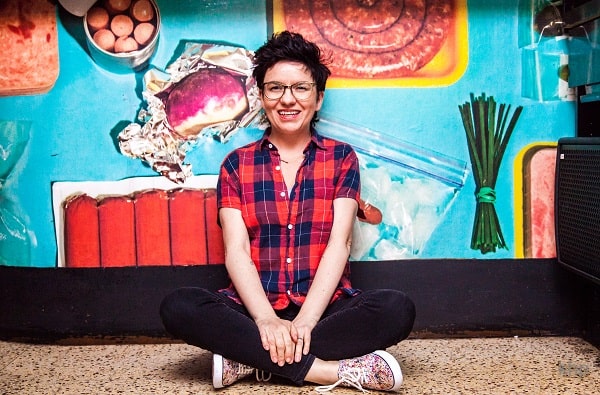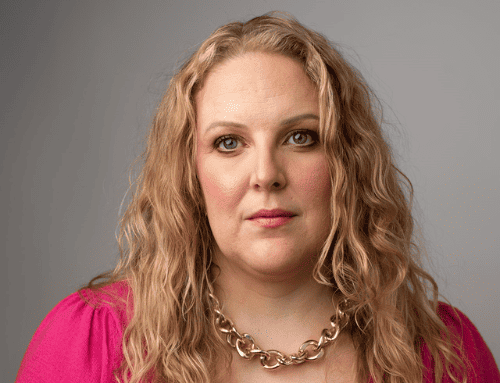Photo by Ksenija Hotic
Ivy Knight loves the restaurant industry, both in spite of and because of its rowdy reputation. She spent ten years working as a line cook before leaving the kitchen to become a food writer.
We spoke to her about her career, kitchen culture, and the industry response to #MeToo.
How did you get involved in the restaurant industry?
I discovered the Food Network and I started watching it obsessively. I’d always been interested in food but I’d never really thought of it as a job. Then I had the opportunity to work in a restaurant in Kingston over the summer, and I loved it. After that I spent ten years cooking professionally.
What did you love about it?
It was genuinely so fun. It’s such hard work and you get paid so little. The whole thing that sells people on this business is that it’s fun. And it’s creative, and insanely exciting, but also really brutal. It’s like you’re in the trenches going to war every night. So you have this gallows humour, and there’s not a lot of thoughtful communication in a kitchen on a busy Saturday night. You become a bit of an animal. And when that’s encouraged and that’s part of the culture, then you become even more of an animal.
What were the biggest challenges you faced in the industry? Did any of them stem from being a woman in a male-dominated industry?
I didn’t really perceive things as challenges because that’s just inherent to the way the business works. I was also quite young, and the ‘wild west’ attitude and sort of lax HR that dominates the industry made for a really fun environment. There were downsides of course, a lot of downsides. But because we didn’t know any better, it was just ‘that’s what you put up with if you’re a chick in this business.’ I just tried to be one of the guys.
I had also always wanted to be a writer, and halfway through my cooking career I realized I didn’t have the mentality to be a good head chef. Being a head chef is kind of the end game, so I felt a bit like I was just spinning my wheels if I wasn’t interested in doing that or opening my own restaurant.
Since you made that transition, you’ve written about sexism and sexual violence in the industry. Recently, you co-wrote an investigative piece in the Globe and Mail about alleged sexual misconduct by Canadian winemaker Norman Hardie. Why is it so important to you that the #MeToo conversation reach the food and beverage industry?
It’s important to me because I’m on the outside now. I’m not powerless in an economic way, and I’m not powerless in some abusive kitchen culture, thinking ‘this is just the way it is.’ Because that’s how it feels when you’re in it. And it doesn’t matter if it’s a kitchen or a law office, if you’re in a toxic environment where anything goes, and there’s no one to report to, you just think that’s the way it is.
This is the first time in human history that women are seeing some comeuppance for sexual violence. As a journalist, it’s incredible to see. I can’t believe these stories are coming out and people are believing the women. I mean, that’s never happened before. People are listening and people are believing the victims. I’m bringing this conversation to the restaurant industry because it’s a world that I love, filled with hardworking people, and it is ready to change.
Women interviewed during the investigation said the attitude in the industry has been to tolerate abuse and harassment, which is frequent and normalized. What is it about the industry that often allows this kind of behaviour to go unchecked? Have you noticed a culture change in the industry since #MeToo began?
I don’t work in kitchens anymore and I haven’t for a long time, so it’s hard to say. Unfortunately the only way to know what’s happening in a kitchen is to be in it. It’s like factory farming, if you’re a chicken activist and you want to know how the chickens are treated at the factory farm, either they won’t let you in or they’ll show you some kind of faux-meadow they’ve set up. If you want to know what kitchen culture is like and you were to step into a kitchen for a day, you’d never see the reality.
What I do know is that when you’re a man who maybe has a lax attitude towards women, or a downright rotten attitude, and for the first time ever see consequences being dealt for that kind of behavior. To the point where an old guard industry like Hollywood is setting the precedent, and basically making a pauper out of a billionaire, I think that ought to scare you. Maybe the thought of going to court never scared you because you never thought it would happen to you. But what about when your former employee says ‘this is what I put up with for years’ and goes to the newspaper or gets a lawyer? You’d have to be really, really into committing acts of sexual violence to keep doing that. Women are talking about it and women all over the place are being believed, you can’t shut them up. I think that’s going to be the biggest thing that will make people change.
What do you think are the next steps food and beverage leaders should take in response to #MeToo?
It’s so simple that it’s almost hard to believe, but what everybody keeps saying to me in one way or another is that you just have to be able to talk to each other. You just have to show your staff that you will listen without judgement, that you will act, and you will make sure that there’s trust between the management and the staff. Make sure that there’s good communication. The Dandelion Initiative teaches a workshop called Safer Spaces that is tailored to bars and restaurants, they are a non-profit made up of sexual assault victims working to change the industry for the better. Hire them.
Every kitchen is like a pirate ship, and the pirate captain is the chef. If the chef doesn’t allow that kind of behaviour, it doesn’t happen. It’s miraculous. You don’t even need HR to dictate. You just need your chef to stop being an ass and say ‘we’re not going to talk this way anymore. I don’t need to cite my daughter or my mother or my aunt to treat every woman properly.’ Kitchens are places where there’s a lot of joking, and a lot of dirty joking, which leads to harassment. All you have to do if you’re a chef is say ‘forget it, it’s not allowed here.’ It doesn’t cost anything.
What advice would you give to a woman or girl who’s interested in pursuing a career in the food and beverage industry?
What I would say is don’t be afraid, because the bad behaviour in this working-class field is just as bad and nasty as it would be in finance or healthcare, it’s just classed-up a bit there. The bottom line is it’s everywhere. If you’re going to go into kitchens, you’re going to know fairly quickly what the vibe is like. The important thing is to never believe that every kitchen is a toxic environment, because that’s not true. Just keep looking until you find a place that deserves you.
If you are the victim of assault or harassment, know your rights. This pdf, supplied by Flora Vineberg, a lawyer who specializes in sexual violence, is a start.
Learn More:
- Confronting Sexual Harassment in the Canadian Film Industry with TIFF
- Q&A: After Unfounded, award-winning journalist Robyn Doolittle delves into #MeToo
- The #MeToo Movement Hasn’t Led To A Better Understanding Of Consent
- Q&A: Support Needs Spike After #MeToo
Take Action:
- Sign up for our e-newsletter to have our latest stories and resources sent to your inbox.
- Follow us on Facebook and Twitter to join a national conversation about empowering girls.







